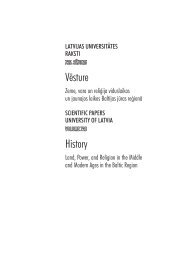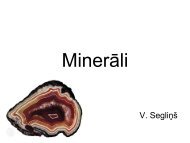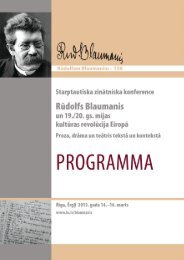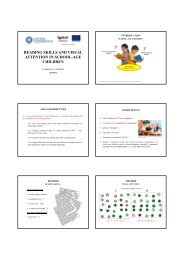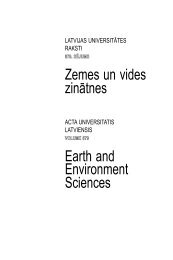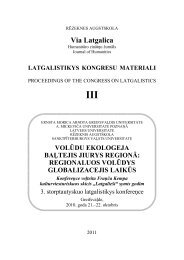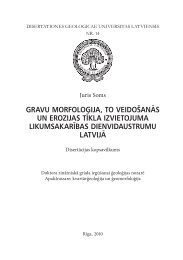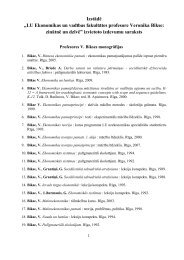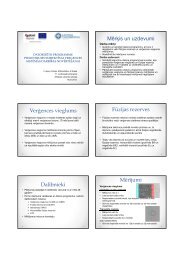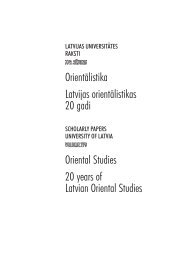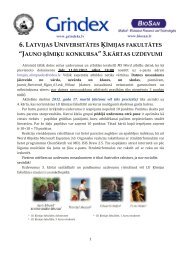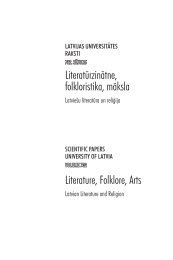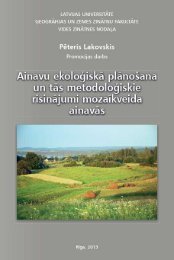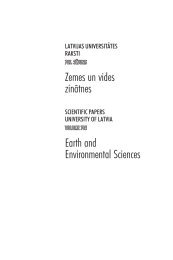Untitled
Untitled
Untitled
You also want an ePaper? Increase the reach of your titles
YUMPU automatically turns print PDFs into web optimized ePapers that Google loves.
182 LITERATÛRZINÂTNE, FOLKLORISTIKA, MÂKSLA<br />
In 1930 they declared their existence and their approach to culture in the journal<br />
Mir aleyn, a collection of poetry, short stories, literary criticism, and essays on art<br />
and criticism. A key article was an essay on the meaning of “mir aleyn” as it suited<br />
their situation both politically and artistically. The journal was meant to be the first of<br />
a series, but it was the only one published. Yet the journal was received to high critical<br />
acclaim. Critics wrote that this group “hears Lithuania” 1 ; and that the journal was<br />
“full of longing to throw off the bonds...that Lithuania is sunk in” 2 . In other words,<br />
the writing reflected both the difficulties of the political and social transition, and the<br />
vision that there would be a freer, better time on the other side of the struggle. They<br />
saw the generations–long history of Jewish life in Lithuania in a long and rich procession<br />
that led to the present. While it was not necessarily clear where the path would<br />
lead from here, the interest was in pressing on.<br />
Yiddish newspapers in Kovne were an important outlet for new literature. Two of<br />
the senior members of the Mir aleyn group worked at two of the main daily newspapers:<br />
Rubin Rubinshteyn was editor of the “Idishe shtime” and Mendl Sudarski was editor of<br />
the “Folksblat”. Both these editors were also writers who sought out and were eager to<br />
publish interesting writing even by unknown talents. It was through their efforts that some<br />
very young writers gained good reputations, and became more widely published.<br />
A number of these promising young writers belonged to Mir aleyn: Yankev<br />
Gotlib, Neyekh Itsik Gotlib, Eliezer Heyman, Yisroel Kaplan, and Khaym and Mayer<br />
Yelin. All were born in Lithuania. Most died in the Holocaust in their early 30s, never<br />
to develop their mature talents. Although Heyman and Khaym Yelin both wrote during<br />
their incarceration in the Nazi ghetto in Kovne, very little or none of that work<br />
could be salvaged.<br />
Among the latest examples of the free work of these writers exists in the 1938<br />
collection, Bleter3 , or Leaves. The book’s introduction states that “the leaves gathered<br />
here are conceived as continual growth from the tree of the young Yiddish<br />
literature”; that the collection itself is “a further milestone on the course of Jewish<br />
artistic creativity”; that it is “a gathering–point of the Yiddish literature so deeply<br />
rooted in Lithuania”.<br />
The collection consists of short stories and poetry. There are three women poets<br />
who write with astonishing clarity about the personal and the political.There are two<br />
stories4 about odd, damaged characters and the damage they can inflict on the communities<br />
that they ostensibly depend on. There are beautiful painterly poems about<br />
the long way Jews took and the precious baggage they carried to arrive in Lithuania<br />
and the present. But these do not fit the topic under examination, and will have to<br />
await their own opportunity, which hopefully will come before another 60 years have<br />
passed since their publication.<br />
Yankev Gotlib 5 was the most–published writer to contribute to Bleter, having four<br />
books of poetry in print by 1938. Gotlib’s first poem was printed in the “Idishe<br />
shtime” in 1925—when he was 14 or 15 years old. He was published in numerous<br />
other newpapers and journals in Lithuania, in Warsaw, in Riga and in New York. His<br />
books, all published in Kaunas, are the 1931 Gold un blut or Gold and Blood, which<br />
Gotlib identifies as the glorious and comforting colors of the Lithuanian sunset. The<br />
poems are both loving and despairing, as he describes his home in a sad beauty, and



